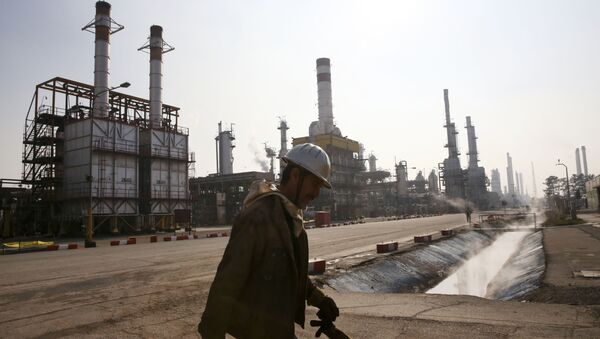Iran will respond in kind if its interests in the Organisation of Petroleum Exporting Countries (OPEC) are damaged, Minister of Petroleum Bijan Zangeneh said after his talks with OPEC Secretary-General Mohammed Barkindo in Tehran on Thursday.
“Iran is part of OPEC due to its interests and if members of the organisation seek to threaten it, Iran will not leave them unanswered,” Zangeneh underscored.
READ MORE: No More Sanctions Waivers for Iranian Oil: US Policy Against Iran Illegal — Prof
He added that he had told Barkindo that OPEC, in turn, is damaged by “the unilateralism of some of its members and that it's possible that the organisation may collapse”.
Additionally, Zangeneh accused “certain” OPEC members of exaggerating their capacities to compensate for any shortfall in the oil supply caused by a tightening of US sanctions on Iran, aimed to zero out Iran’s oil exports.
“As I have already said, the US wishes to cut Iran’s oil exports to zero but this is a pious hope. Any independent market expert knows that a surplus of capacities declared by certain countries is exaggeration and overstatement”, Zangeneh told the opening of the 24th International Oil, Gas, Refining and Petrochemical Exhibition in Tehran on Wednesday.
In late April, Zangeneh did not mince words and berated Saudi Arabia and the United Arab Emirates (UAE) for overstating their oil capacities.
READ MORE: US Will No Longer Provide Sanctions Waivers for States Importing Iran Oil
Saudi Energy Minister Khalid Al-Falih, for his part, noted that he did not see any need for Riyadh to raise oil output in response to the tougher anti-Iranian sanctions, but added that Saudi Arabia would supply “more oil if asked to by its customers”.
The six-month waivers from oil sanctions against Iran were granted by the US in early November 2018 to Greece, Italy, Taiwan, China, India, Turkey, Japan, and South Korea.
READ MORE: Iran Has Other Ways to Stop Oil Flow Besides Closing Strait of Hormuz — Official
The move followed the US withdrawal from the 2015 Iran nuclear deal, also known as the Joint Comprehensive Plan of Action (JCPOA), in May 2018.
After that, Washington has repeatedly stressed that it wants all importers to eventually cut their oil sales from Iran to zero, in what the US claims will have a significant impact on the Islamic Republic’s economy.


